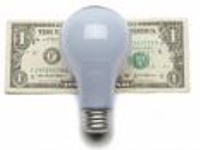Energy Efficiency - The Cheapest Energy Available
 Washington, D.C. - Energy efficiency remains America’s cheapest, cleanest, and fastest energy source for five years running. That’s the conclusion of a new study that shows that the utility cost per kilowatt-hour (kWh) of energy efficiency has held steady or even slightly declined at about 2.5 cents over the last half decade, even as the costs for new coal, nuclear, and other supply-side energy alternatives have risen.
Washington, D.C. - Energy efficiency remains America’s cheapest, cleanest, and fastest energy source for five years running. That’s the conclusion of a new study that shows that the utility cost per kilowatt-hour (kWh) of energy efficiency has held steady or even slightly declined at about 2.5 cents over the last half decade, even as the costs for new coal, nuclear, and other supply-side energy alternatives have risen.
Saving Energy Cost-Effectively: A National Review of the Cost of Energy Saved Through Utility-Sector Energy Efficiency Programs updates the American Council for an Energy-Efficient Economy’s (ACEEE) widely cited benchmark research of 2004 showing that the average cost of delivering energy efficiency programs in the U.S. was then 3 cents per kWh.
The report notes: “In contrast, recent conventional energy supply-side options have typically cost between $0.07 and $0.15 per kWh - about three to four times the cost of energy efficiency investments … In 2008, pulverized coal cost between $0.07 and $0.14 per kWh, combined-cycle natural gas cost between $0.07 and $0.10 per kWh, and wind cost between $0.04 and $0.09 per kWh … Furthermore, as energy supply-side resource costs are highly volatile, energy efficiency remains a financially stable, long-term investment. In the near future, this cost picture will likely be very similar.”
The U.S. Energy Information Administration (EIA) estimates that in 2020 new conventional power plants including coal and nuclear will cost about $0.10 per kWh, or four times higher than current energy efficiency program costs.
The new ACEEE report looks at energy efficiency programs from recent years in 14 states, with utility costs ranging from $0.016 to $0.033 per kWh and an average cost of $0.025 per kWh. ACEEE gathered data on energy efficiency program costs in 14 states - California, Connecticut, Iowa, Massachusetts, Minnesota, Nevada, New Mexico, New Jersey, New York, Oregon, Rhode Island, Texas, Vermont, and Wisconsin. The six natural gas efficiency programs covered in the report also saved energy cost-effectively - spending $0.27 to $0.55 per therm, with an average of $0.37 per therm, less than a third of the average residential retail price seen over the past five years.
Maggie Eldridge, report co-author, ACEEE, said: “Our new findings have major implications for the U.S. Senate deliberations on climate legislation, the upcoming Copenhagen summit, and state-level decisions about other sources for new power generation. The data show conclusively why energy efficiency should be universally regarded as the ’first fuel’ in making energy decisions. It is cheaper, cleaner, faster, and more easily realized than any other resource out there.”
Katherine Friedrich, lead author of the report, ACEEE, said: “Energy efficiency is by far the least costly energy resource option available for utility resource portfolios. Saving a kilowatt-hour through energy efficiency improvements is easily one-third or less the cost of any new source of electricity supply, whether conventional fossil fuel or renewable energy source.
The results of this research suggest that the cost of energy efficiency has remained very consistent over time, even in the face of increasingly ambitious energy savings levels. Energy efficiency appears to be a resource that continues to renew itself - the more energy efficiency opportunities we look for, the more we find.
Dan York, co-author and acting utilities program director, ACEEE, said: “This study clearly demonstrates the very real value provided to utility customers of these energy efficiency programs. We encourage regulators, utilities, and policymakers to continue to support and expand such programs in order to continue to reap the multiple benefits they provide for customers, utilities, the economy, and the environment. Energy efficiency is a cost-effective solution to many problems, including the growing economic and environmental costs of carbon dioxide emissions.”
Saving Energy Cost-Effectively: A National Review of the Cost of Energy Saved Through Utility-Sector Energy Efficiency Programs is available for free download.For More Information: ACEEEYou can return to the main Market News page, or press the Back button on your browser.

